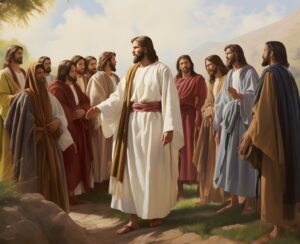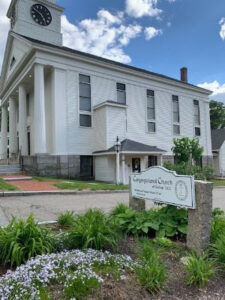… You who dwell in the shelter of the Lord,
Who abide in His shadow for life,
Say to the Lord, “My refuge, my rock in whom I trust!”
… And He will raise you up on eagles’ wings,
Bear you on the breath of dawn,
Make you to shine like the sun!
And hold you in the palm of His hand.
… The snare of the fowler will never capture you,
And famine will bring you no fear.
Under His wings your refuge, His faithfulness your shield.
… And He will raise you up on eagles’ wings,
Bear you on the breath of dawn,
Make you to shine like the sun!
And hold you in the palm of His hand.
– Michael Joncas, from “On Eagle’s Wings” (1977)
 I gave up on watching television around the turn of this century. It wasn’t anything I planned to do, but I cannot abide canned laughter, and gradually I stopped caring about whatever the daily news might be. And wow, what a sinkhole for time TV was! Lately, though, I have found that spending a little before-dinner time with my husband is nice. My mind peters out for working shortly before five o’clock each day, and our great room opens onto a snack counter into the kitchen, where my husband will be making our family’s dinner. I used to be a terrible cook, but my husband is a happy chef who does surprising things like using recipes and thinking through creative salads and desserts. I can chat with him across the counter while I do my daily treadmill steps.
I gave up on watching television around the turn of this century. It wasn’t anything I planned to do, but I cannot abide canned laughter, and gradually I stopped caring about whatever the daily news might be. And wow, what a sinkhole for time TV was! Lately, though, I have found that spending a little before-dinner time with my husband is nice. My mind peters out for working shortly before five o’clock each day, and our great room opens onto a snack counter into the kitchen, where my husband will be making our family’s dinner. I used to be a terrible cook, but my husband is a happy chef who does surprising things like using recipes and thinking through creative salads and desserts. I can chat with him across the counter while I do my daily treadmill steps.
 My husband cares about politics. But I try hard to ignore politics, because it is one of my guiding principles that if I cannot effect an outcome, then I don’t want to even know about the problem. Why worry about something that you cannot fix? For Christmas last year, our children gave Edward what must be the world’s most gigantic television, which now takes up the wall above our great room fireplace. So last Saturday, he was watching a political rally get started while he made our dinner and I treaded away. I usually wouldn’t bother, but once I had finished my steps, I sat down on the couch for a moment and watched the start of the rally that he was watching. My only thought was amazement that so many people would sit in the un-sheltered sun for so long, just to hear from Donald Trump? Donald Trump, for heaven’s sake. Red hat and all. So he went up on that stage, and he began to talk. And then he turned his head to point out some things on a diagram, and there were pops that I knew were gunfire, although the announcer told us they were firecrackers. Trump grabbed at his ear, and then he ducked down on his own so I knew that he had not been hit. I thought perhaps an insect might have bitten him? But of course, by now you know the rest.
My husband cares about politics. But I try hard to ignore politics, because it is one of my guiding principles that if I cannot effect an outcome, then I don’t want to even know about the problem. Why worry about something that you cannot fix? For Christmas last year, our children gave Edward what must be the world’s most gigantic television, which now takes up the wall above our great room fireplace. So last Saturday, he was watching a political rally get started while he made our dinner and I treaded away. I usually wouldn’t bother, but once I had finished my steps, I sat down on the couch for a moment and watched the start of the rally that he was watching. My only thought was amazement that so many people would sit in the un-sheltered sun for so long, just to hear from Donald Trump? Donald Trump, for heaven’s sake. Red hat and all. So he went up on that stage, and he began to talk. And then he turned his head to point out some things on a diagram, and there were pops that I knew were gunfire, although the announcer told us they were firecrackers. Trump grabbed at his ear, and then he ducked down on his own so I knew that he had not been hit. I thought perhaps an insect might have bitten him? But of course, by now you know the rest.
 I had a live, front-row seat to the moment when Donald Trump’s fortuitous split-second turn of his head meant that instead of being assassinated on live TV, he came within a fraction of an inch of dying. Given the size of that television, it happened life-sized and right in front of me. I tried not to write about that moment this week. I swear. I really tried. But as much as I have repeatedly asked my Thomas to give me something else to write about, he has continued to flesh out that moment as a topic. He tells me that he wants all of us who are still in bodies to better understand how God will sometimes actively work in the world.
I had a live, front-row seat to the moment when Donald Trump’s fortuitous split-second turn of his head meant that instead of being assassinated on live TV, he came within a fraction of an inch of dying. Given the size of that television, it happened life-sized and right in front of me. I tried not to write about that moment this week. I swear. I really tried. But as much as I have repeatedly asked my Thomas to give me something else to write about, he has continued to flesh out that moment as a topic. He tells me that he wants all of us who are still in bodies to better understand how God will sometimes actively work in the world.
 Very few people who are now alive are aware that there was a long-ago moment in American history when God also put God’s hand on the scale this way. It was during the American Revolutionary War. I only understand how close the American colonies came to losing their Revolution against the British Empire because thirty years ago I wrote My Thomas, which is an historically accurate novel about Thomas Jefferson’s ten-year marriage that neatly spanned that Revolutionary period. Back then, I did considerable research, so I know that it was really only the extremely fortuitous intervention of France on the side of the American colonies that enabled them to win their war. France sent a fleet to prevent Lord Cornwallis’s army from being rescued by sea at Yorktown, Virginia in October of 1781, which then forced Cornwallis to surrender his whole army to George Washington. And the painstaking courting of France to intervene on the colonies’ side had been largely the work of one of the unlikeliest of men, a charming reprobate named Benjamin Franklin. But it was a very near thing! If not for Benjamin Franklin, with his wit and charm and his amusing penchant for odd public inventions, and his willingness to spend so much time in France courting France’s support for the American colonies, Great Britain likely would have worn the American colonies down fairly soon thereafter, until they felt forced to sue for peace. British America then would have become like Canada or Australia. Not such a terrible fate, of course. But then there would have been no Declaration of Independence. No Constitution. And no government of, by, and for the people. No single continent-wide nation, and certainly not the heritage that we Americans 248 years later are so very proud to claim!
Very few people who are now alive are aware that there was a long-ago moment in American history when God also put God’s hand on the scale this way. It was during the American Revolutionary War. I only understand how close the American colonies came to losing their Revolution against the British Empire because thirty years ago I wrote My Thomas, which is an historically accurate novel about Thomas Jefferson’s ten-year marriage that neatly spanned that Revolutionary period. Back then, I did considerable research, so I know that it was really only the extremely fortuitous intervention of France on the side of the American colonies that enabled them to win their war. France sent a fleet to prevent Lord Cornwallis’s army from being rescued by sea at Yorktown, Virginia in October of 1781, which then forced Cornwallis to surrender his whole army to George Washington. And the painstaking courting of France to intervene on the colonies’ side had been largely the work of one of the unlikeliest of men, a charming reprobate named Benjamin Franklin. But it was a very near thing! If not for Benjamin Franklin, with his wit and charm and his amusing penchant for odd public inventions, and his willingness to spend so much time in France courting France’s support for the American colonies, Great Britain likely would have worn the American colonies down fairly soon thereafter, until they felt forced to sue for peace. British America then would have become like Canada or Australia. Not such a terrible fate, of course. But then there would have been no Declaration of Independence. No Constitution. And no government of, by, and for the people. No single continent-wide nation, and certainly not the heritage that we Americans 248 years later are so very proud to claim!
My Thomas tells me that indeed we witnessed a genuine miracle performed directly by God last Saturday evening. He wants us all to know that. As was true when God reached into human history and used the unlikely person of Benjamin Franklin to bring France into the American Revolution in order to give these colonies a freer and stronger beginning as a nation, with wonderful founding documents built around freedom for each individual and a continent-wide nation, so again on last Saturday eveing God reached into human history and turned Donald Trump’s head just enough and at just the right moment to save his life. We can only guess why. Perhaps, since God’s hand was in the founding of this nation, so also God’s interest continues in its governance? For whatever reason, it will be interesting to see now how this presidential election turns out, and whether God casts an overriding vote there as well. Thomas tells me that it is highly unusual for God to so minutely intervene in human events this way. But God, outside of time, knows our future risks, as of course you and I do not.
 They are sometimes called “God Winks.” These unexpected moments when God reaches into human space and time and does something, and we notice it. The first time I was made aware that these things can happen was more than fifty years ago, in the late sixties or the early seventies, and in a popular science magazine. Back as late as the nineteen-seventies, apparently there were still many empty spots in the night sky remaining to be found. Who knew? And who cared? So back then, I came across an article in a popular science magazine by an astronomer whose hobby was filling in those empty spots in the sky. I kid you not. He would train a telescope on a spot in the night sky that was empty, and he would document that fact. Photograph it. Well, will you look at that! Entirely empty. Then he would come back precisely one year later and look at that same spot in the night sky through that same telescope, and now that spot would be full of billions of galaxies. His article in that old science magazine told us that this happened every time he tried it. He said that there were others, too, who shared his peculiar hobby. What would you call it? Pointing out to God the spots in the sky that still needed to be filled in with stars? This astronomer predicted that before very long, it was going to be hard to find any starless spots left.
They are sometimes called “God Winks.” These unexpected moments when God reaches into human space and time and does something, and we notice it. The first time I was made aware that these things can happen was more than fifty years ago, in the late sixties or the early seventies, and in a popular science magazine. Back as late as the nineteen-seventies, apparently there were still many empty spots in the night sky remaining to be found. Who knew? And who cared? So back then, I came across an article in a popular science magazine by an astronomer whose hobby was filling in those empty spots in the sky. I kid you not. He would train a telescope on a spot in the night sky that was empty, and he would document that fact. Photograph it. Well, will you look at that! Entirely empty. Then he would come back precisely one year later and look at that same spot in the night sky through that same telescope, and now that spot would be full of billions of galaxies. His article in that old science magazine told us that this happened every time he tried it. He said that there were others, too, who shared his peculiar hobby. What would you call it? Pointing out to God the spots in the sky that still needed to be filled in with stars? This astronomer predicted that before very long, it was going to be hard to find any starless spots left.
 Nowadays astronomers’ equipment is a lot more sophisticated, and sometimes they still will find little weirdnesses in the night sky. In a recent case, what astronomers have found is a few fully-formed and mature galaxies at a time in the very early history of the cosmos when they simply should not be there. The human playground which is our reality was in fact created in relative earth-time a lot more recently than God wants us to believe that it was created. So of course, the cosmos is a lot younger as well, which means that our finding mature galaxies back then where they do not belong is not a God Wink, precisely; it is more like a “God Oopsie”, if you will. But nobody is perfect!
Nowadays astronomers’ equipment is a lot more sophisticated, and sometimes they still will find little weirdnesses in the night sky. In a recent case, what astronomers have found is a few fully-formed and mature galaxies at a time in the very early history of the cosmos when they simply should not be there. The human playground which is our reality was in fact created in relative earth-time a lot more recently than God wants us to believe that it was created. So of course, the cosmos is a lot younger as well, which means that our finding mature galaxies back then where they do not belong is not a God Wink, precisely; it is more like a “God Oopsie”, if you will. But nobody is perfect!
 Now let’s return to the topic of last Saturday’s genuine miracle performed by God. The more I consider it, the more amazing it seems. Late in the week I came across a computer reconstruction of how it happened that I would love to show to you now, but it was buried in a long article and not removable. Direct forehead shot. His head moves just enough at the last possible micro-instant, so instead of entering his forehead and his brain and killing him, the bullet grazes the right side of his head and then his head moves back again into what would have been the path if another bullet that had followed the first, just as his hand comes up in response to the pain of his having felt that first bullet hit his right ear. So he is beginning to duck down, and that next bullet just misses the top of his head. And it all happened in a micro-instant in earth-terms. Very neatly done, dear God, I must say. Truly amazingly very well done.
Now let’s return to the topic of last Saturday’s genuine miracle performed by God. The more I consider it, the more amazing it seems. Late in the week I came across a computer reconstruction of how it happened that I would love to show to you now, but it was buried in a long article and not removable. Direct forehead shot. His head moves just enough at the last possible micro-instant, so instead of entering his forehead and his brain and killing him, the bullet grazes the right side of his head and then his head moves back again into what would have been the path if another bullet that had followed the first, just as his hand comes up in response to the pain of his having felt that first bullet hit his right ear. So he is beginning to duck down, and that next bullet just misses the top of his head. And it all happened in a micro-instant in earth-terms. Very neatly done, dear God, I must say. Truly amazingly very well done.
 Donald Trump is two months older than I am. He was a publicity-hound when young, so I have always been aware of him. He had a big, brash, in-your-face ego, and he was a New York libertine. I can see how he might make a good politician, with that ego; and having run large businesses might have given him some good executive experience. But he didn’t seem to be the sort of morally upright person that you would think that God might choose? However, in the past week my Thomas has taught me that actually, Donald Trump is “of a type” that God does choose. Together with Benjamin Franklin and also the ancient Hebrew King David, born a thousand years before Jesus, who is someone else that Thomas has added to our short list of three who are the sort of man that God often relies upon for God’s Own purposes. Here are three reasons why:
Donald Trump is two months older than I am. He was a publicity-hound when young, so I have always been aware of him. He had a big, brash, in-your-face ego, and he was a New York libertine. I can see how he might make a good politician, with that ego; and having run large businesses might have given him some good executive experience. But he didn’t seem to be the sort of morally upright person that you would think that God might choose? However, in the past week my Thomas has taught me that actually, Donald Trump is “of a type” that God does choose. Together with Benjamin Franklin and also the ancient Hebrew King David, born a thousand years before Jesus, who is someone else that Thomas has added to our short list of three who are the sort of man that God often relies upon for God’s Own purposes. Here are three reasons why:
FIRST, all three were sexual libertines when young. King David, Benjamin Franklin, and Donald Trump, all three of them were wild to an unusual extent for their respective places and times. Do you want to see a sexual libertine? I’ll give you one. King David had three hundred wives and seven hundred concubines, but he lusted after Bathsheba, too, so he arranged for her husband to be killed in battle since David had gotten her pregnant while the man was away fighting in David’s army. (She later gave birth to David’s heir, Solomon, but that is another story.) All of this might perhaps indicate an excess of testosterone in the three of them? Who knows? But it certainly seems to indicate that human sexual morality is not a priority on God’s list.
SECOND, they were and are big, ambitious, independent thinkers. Again, all three of them. And when it comes to caring about the well-being of the people they feel responsible for, these men’s morality is off the charts (Well, maybe David’s not quite so much) All three were and are fiercely courageous nonconformists, willing to stick their necks out, and to lead and to fight for their cause, whatever that cause might be. My husband tells me that in Donald Trump’s case, this means giving up a billionaire’s retirement for his vision that he can somehow reclaim the Founders’ original vision for the American people.
THIRD, they were and are amazingly stubborn about holding fast to whatever might be their cause. To see Donald Trump stand up at once with his fist in the air and his head above his Secret Service protection, even though he knew he had a bullet wound to the head for heaven’s sake and there still might be bullets flying, and he was shouting, “Fight! Fight! Fight!” was unbelievable. We were in full courageous-lunatic-battles-for-his-cause territory right there!
 None of these men were traditionally religious. Not at first. King David grew to rely on God, and to become a wonderful psalmist as some of his more miraculous battlefield successes made it ever clearer to him that he was getting supernatural help. And some who watched the Republican Convention thought that Donald Trump, too, seemed to have about him the serene look of a man transformed. Is it true that when they brought on stage the uniform of Corey Comperatore, the fireman who died at that rally shielding his wife and daughters from a bullet, Donald Trump actually hugged and kissed the man’s uniform and helmet? It seems apparent that it wasn’t that these three men had chosen a religious cause to champion, but rather God knows our deepest hearts. And the causes that had seized each of these men’s minds were causes that also, even if only by coincidence, turned out to be very important to God.
None of these men were traditionally religious. Not at first. King David grew to rely on God, and to become a wonderful psalmist as some of his more miraculous battlefield successes made it ever clearer to him that he was getting supernatural help. And some who watched the Republican Convention thought that Donald Trump, too, seemed to have about him the serene look of a man transformed. Is it true that when they brought on stage the uniform of Corey Comperatore, the fireman who died at that rally shielding his wife and daughters from a bullet, Donald Trump actually hugged and kissed the man’s uniform and helmet? It seems apparent that it wasn’t that these three men had chosen a religious cause to champion, but rather God knows our deepest hearts. And the causes that had seized each of these men’s minds were causes that also, even if only by coincidence, turned out to be very important to God.
Of course, in this case we don’t yet know why God chose to save Donald Trump’s life. I have even wondered whether it might have been primarily for the nomination of JD Vance, the very young man of the people that Donald Trump chose for his vice president on the following Monday, that Trump’s life was saved. And since this is not a political blog I ask that you not discuss in the comments here any specific politician, but please save those discussions for more appropriate venues.
 We only know that, amazingly and wonderfully, it did happen. God Winked at all of us last Saturday evening, and a life was saved. And no matter what your own politics might be, it does seem good for all of us to know that just as God cared enough 248 years ago to help those founding British colonists to make a stronger beginning as a nation here, so God still seems to care enough about this nation now to have an opinion about who might be the better choice for our next president. Even though we don’t yet know the reason why God might have made this choice.
We only know that, amazingly and wonderfully, it did happen. God Winked at all of us last Saturday evening, and a life was saved. And no matter what your own politics might be, it does seem good for all of us to know that just as God cared enough 248 years ago to help those founding British colonists to make a stronger beginning as a nation here, so God still seems to care enough about this nation now to have an opinion about who might be the better choice for our next president. Even though we don’t yet know the reason why God might have made this choice.
… You need not fear the terror of the night,
Nor the arrow that flies by day,
Though thousands fall about you, near you it shall not come…
And He will raise you up on eagles’ wings.
Bear you on the breath of dawn,
Make you to shine like the sun!
And hold you in the palm of His hand.
… For to His angels He’s given a command,
To guard you in all of your ways.
Upon their hands they will bear you up,
Lest you dash your foot against a stone.
… And He will raise you up on eagles’ wings,
Bear you on the breath of dawn.
Make you to shine like the sun,
And hold you in the palm of His hand.
… And hold you, hold you in the palm of His hand.
– Michael Joncas, from “On Eagle’s Wings” (1977)






















 J
J











































